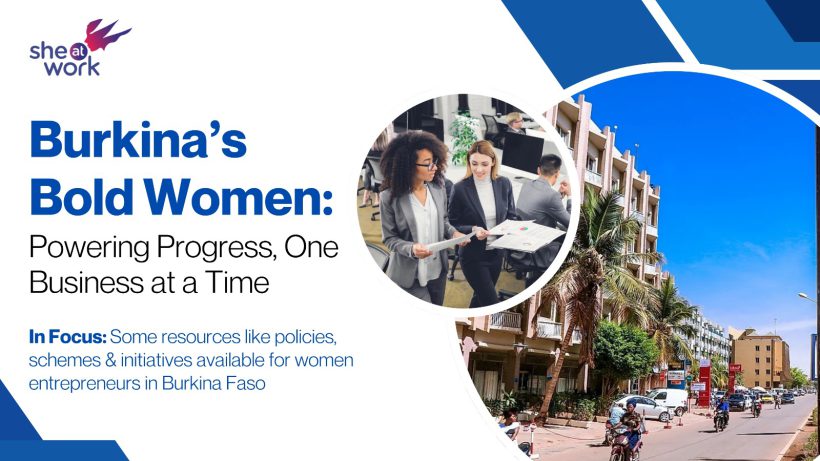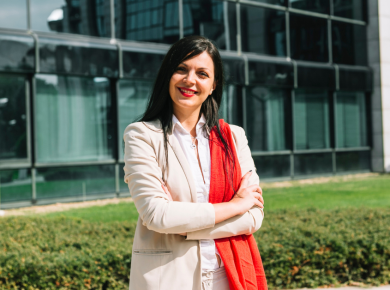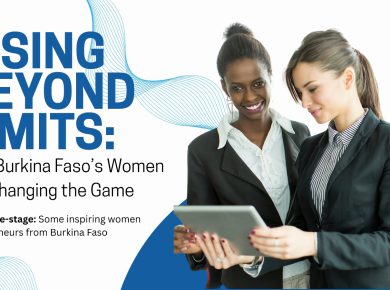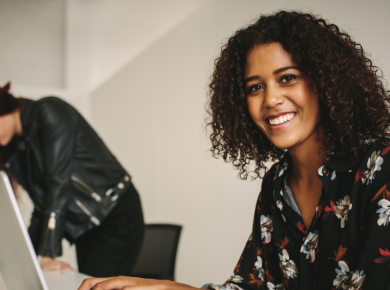In Focus: Some resources like policies, schemes & initiatives available for women entrepreneurs in Burkina Faso
#BurkinaWomenRise #SheBuildsBurkina #WomenInBusiness #EmpowerHerAfrica #EntrepreneurPower
In Burkina Faso known as “The Land of the Upright Men” or “The Land of Upright People”, a nickname that reflects the integrity, honesty & dignity of the country’s citizens. Mainly women, who stand at the centre of society – feeding communities, managing households, and now, building businesses that are reshaping the nation’s economy. With growing potential across agriculture, renewable energy, mining, and digital services, the country is actively transforming. And, on a positive note, women entrepreneurs are being recognized as key drivers of this change.
Unlocking Opportunity for Women Entrepreneurs
Though rich in opportunity, women in Burkina Faso still face steep challenges like – limited land ownership, scarce financing options & socio-cultural norms that restrict participation in formal economic activities. In fact, only 8% of women own land, despite being the backbone of small-scale farming & food production in the country.
Seeds of Strength: How Burkina Faso’s Women are Growing more than Crops
But change is brewing. National policies, donor-backed initiatives, and regional programmes are coming together to create a more inclusive entrepreneurial ecosystem. Women-led innovations – like using nutrient-rich fish farming water to grow crops, are gaining attention for their environmental and economic benefits. At the same time, efforts to expand access to finance, markets, training & technology are really helping to level the playing field.
Overall, Burkina Faso’s policies for women entrepreneurs aim to create a more equitable, inclusive environment for women – to participate in the economy, address gender-specific constraints & promote sustainable development too.
As Burkina Faso taps into its regional trade potential and strengthens infrastructure, empowering women entrepreneurs isn’t just the right thing to do. It is indeed, a strategic move toward sustainable growth. And women are ready to rise!!
Let us now explore some resources like policies, schemes and initiatives that are available for women entrepreneurs in Burkina Faso.
> Tanager
Tanager, an affiliate of the AV Group, is a global development organization that empowers people to realize life-changing economic and social opportunities. The focus is on empowering communities worldwide, and work closely with communities to reduce poverty, end hunger, increase gender equality & ensure sustainable consumption worldwide.
They address challenges at a systems level. They also thread gender-inclusive approaches and climate change perspectives throughout each project. Their core areas of expertise include: Gender-transformative and Nutrition-sensitive Agriculture, Sustainable, Climate-smart Supply Chains, and creating Economic Opportunities for Youth and Other Marginalized Groups. Thus, Tanager strengthens job skills, fosters entrepreneurship, and creates jobs among young adults and other systemically excluded populations, across a multitude of cultures and contexts.
> Project SELEVER 2
Project SELEVER 2 is all about – Better Nutrition through Women’s Economic Empowerment and Stronger Poultry Markets.
There is a significant market for local poultry in Burkina Faso, and it is growing. It is estimated that demand for local chickens will increase by 1,400 tons per year over the next 10 years. Yet, small-holder poultry farms are not equipped to respond to this demand, and the local poultry value chain does not deliver the services to jumpstart this market.
Soutenir l’Exploitation Famaliales pour Lancer l’Elevage des Volailles et Valoriser l’Economie Rurale (SELEVER 2) is a six-year Gates Foundation-funded programme designed to improve the nutritional status of women and children in rural Burkina Faso, by strengthening women’s economic empowerment through increased poultry production. SELEVER 2 will holistically leverage the entire poultry sector in Burkina Faso – including government entities and the private sector – to increase incomes for women, support women’s inclusion in the poultry sector, and improve community access to nutritious and diverse foods. Women in the SELEVER II programme will be engaged as – poultry producers, entrepreneurs & private-sector actors in the input market – specifically as providers of vaccines and feed through small and medium-sized businesses (SMEs). SELEVER II will also work to facilitate SME access to financing and business skills needed to grow and sustain businesses.
Plus, SELEVER 2 also works at the community level – to raise awareness and change social norms about entrepreneurship opportunities for women throughout the poultry value chain. They target activities toward women, while also engaging men, to improve women’s positions in the household and ownership over income from poultry. The project will demonstrate that when women are empowered, they can obtain a sufficient quality and quantity of diverse foods for their households and improve nutritional outcomes.
https://tanagerintl.org/portfolio/improving-gender-and-nutrition-with-stronger-poultry-markets/
> IGNITE+ Project
IGNITE+ Launch set the roadmap for scaling Gender & Nutrition outcomes in Agriculture.
Launch of IGNITE+ in Kenya and Burkina Faso: The IGNITE+ project aims to strengthen African agricultural institutions by integrating gender and nutrition-sensitive approaches. It builds on the success of the original IGNITE programme, which ran from 2018 to 2024.
Impact and Achievements: The IGNITE programme provided technical assistance to 35 agricultural institutions across 18 African countries. In Burkina Faso, the Professional Association of Decentralized Financial Systems transitioned from a client to a local service provider, enhancing its capacity to offer gender and nutrition integration services.
Future Vision and Collaboration: IGNITE+ plans to scale its impact across Burkina Faso, Ethiopia, Kenya, Nigeria & Tanzania. The project emphasizes collaboration with various stakeholders to ensure inclusive growth, increased incomes, and better nutrition outcomes for small-scale producers.
IGNITE’s many accomplishments have strengthened Tanager’s standing – as a thought leader and agent of change and provided the technical expertise on gender & nutrition required to transform Africa’s agricultural sector.
Under IGNITE+, Tanager plans to scale these achievements to positively impact hundreds of smallholder farmers in the focus countries of Burkina Faso, Ethiopia, Kenya, Nigeria, and Tanzania. Similar to the IGNITE model, the technical assistance will be provided jointly between Tanager and six LSPs.
As Burkina Faso and Kenya’s agriculture sectors continue to evolve, IGNITE+ will serve as a catalyst – to building an Africa where agriculture promotes inclusive growth, increased incomes, and better nutrition outcomes for small-scale producers and their households.
https://tanagerintl.org/2024/12/18/ignite-plus-launch-in-kenya-burkina-faso-sets-roadmap/
> Commission for the Promotion of Women’s Entrepreneurship (COPEF)
The Burkinabé government has organized projects, in terms of women’s empowerment – to bring women entrepreneurs towards effective ‘empowerment’.
Several structures set up programs and projects for the empowerment of women:
The Chamber of Commerce and Industry of Burkina Faso (CCI-BF) has set up a specialized commission dedicated to this theme. Known as the Commission for the Promotion of Women’s Entrepreneurship (COPEF), it is responsible for: leading reflection on the obstacles that hinder the advancement of women in business; to propose actions in line with the problems identified and propose any projects or incentives aimed at promoting women’s entrepreneurship.
The Commission for the Promotion of Women’s Entrepreneurship (COPEF) is an organization of the national forum on innovation for women entrepreneurs. It was set up by the CHAMBER OF COMMERCE and its mission is – to reflect on the obstacles that hinder the promotion of women in business and to propose actions in line with the problems identified. This body is responsible for proposing all projects or incentives aimed at promoting women’s entrepreneurship.
Four major acts will mark the course of this first forum; these are in particular:
– The official launch of the first web portal dedicated to women’s entrepreneurship during the opening ceremony;
– Animation, by national experts, of panels around the issue of women’s entrepreneurship in Burkina Faso;
– The publication of the “First directory of the Top 100 Burkinabè businesswomen” during a night called “Night of recognition of the merit of women fighters”;
– Competition of innovative projects in favor of women’s entrepreneurship.
https://www.womenconnect.org/web/burkina-faso/empowerment
> Permanent Secretariat of the National Council for the Promotion of Gender (SP/CONAP Genre)
This body has implemented specific programmes for women’s empowerment through:
– Creation of a general directorate for the economic empowerment of women;
– Various training and sensitization of women on themes related to women’s entrepreneurship and women’s empowerment;
– Support in setting up files
– Funding of women’s projects
– Creation of specific funds for women’s entrepreneurship
– Organization of study trips, incubation etc.
– Raising awareness and training in entrepreneurship
– Gender and entrepreneurship training
– Implementation of the support program for women’s entrepreneurship
https://www.womenconnect.org/web/burkina-faso/empowerment
> Ministry of Women, National Solidarity, Family and Humanitarian Action
This ministry is responsible for women’s empowerment to provide:
– Support for the formalization of 1,000 women’s businesses
– Provision of 500 rural women with agricultural inputs
– Acquisition of processing, catering, sewing and hairdressing technologies for the benefit of 100 women’s associations and groups
– Financially support 429 coordination of women’s organizations for the identification of victims of VEFF and the establishment of civil status documents
A list of initiatives and how they intend to benefit women entrepreneurs
Events and activities organized for this purpose:
– The establishment of a group of independent research experts on women’s entrepreneurship
– The attachment of FAARF to its technical supervision at the Ministry in charge of women
– Creation of an incubation center for young women entrepreneurs
– Organization of regional competitions and a national competition for female entrepreneurship
– Organization of regional forums and the national and women’s forum
https://www.womenconnect.org/web/burkina-faso/empowerment
> L’OCCITANE
Since 1980s L’OCCITANE has been working with women producers of shea butter in Burkina Faso – through support and co-development. L’OCCITANE has also been recognized since 2013 as an exemplary company by the UNDP (United Nations Development Programme).
This project aims to do a number of things. Like – to improve the coverage of educational needs by teaching women to read, write and count; support the creation and management of income-generating activities; provide support for agricultural entrepreneurship with training; encourage the development of eco-citizen behaviour within the beneficiary population; and by and large, expand women’s empowerment in Burkina Faso.
The Learn to Change project aims to extend the financial empowerment goals of Burkinabe women to the provinces of Sissili and Ziro, in the Center-West region of the country.
https://fondation.loccitane.com/logos,1,2,29,413.htm
https://www.womenconnect.org/web/burkina-faso/empowerment
> SOS SAHEL
SOS SAHEL International Burkina Faso is a Burkinabe non-governmental organization (NGO) established in 1982 to support rural populations in the Sahel affected by drought through sustainable development projects.
It is part of the SOS SAHEL International federation, made up of associations from the Global South — Burkina Faso, Mali, Mauritania, Niger, Senegal, Ethiopia, Sudan, and Chad; and from the Global North — France, Luxembourg, and Great Britain. SOS SAHEL International Burkina Faso is officially recognized under registration no. 12/IS/SG/DAP dated August 2, 1988.
SOSSIBF’s mission is – “To cultivate the spirit of national and international solidarity for the benefit of underprivileged populations in Burkina Faso”.
SOS SAHEL International Burkina Faso (SOSSIBF) has been committed to improving the well-being of vulnerable populations in Burkina Faso. Its main mission is – to foster national and international solidarity in favor of the country’s most disadvantaged communities. Through its initiatives, the NGO aims to promote sustainable, equitable, and inclusive development, focusing on the needs of rural populations—especially those affected by poverty, food insecurity, and the impacts of climate change.
Their Vision is that they “dream of a Burkina Faso where all people have continuous and equitable access to the benefits of sustainable development.”
https://www.womenconnect.org/web/burkina-faso/empowerment
> Diakonia
Diakonia works in the longterm perspective – to change political, economic, social and cultural structures. They support local organizations while organizing awareness and information campaigns. All of these actions are necessary to address the roots of poverty and empowerment of women.
Diakonia, through the Gender Mainstreaming Project in Private Sector Development in Burkina Faso – is the result of a partnership between the Ministry of Commerce, Industry and Handicrafts and the Common Gender Fund.
The project was financed with more than 250 million CFA francs and aims to empower women economically. The project started with 50 women per region. These women have had capacity building to enable them to improve their entrepreneurial capacity. After that, they proceeded to the selection of 25 women/region to accompany them in the formalization of their businesses. After this process, reinforcement actions continued in the 13 regions. With approved management centers and business formality centers, it has granted grants – so that they can formalize their business. In the end, the PMG/DSP-BF selected and rewarded women with very high potential working in the informal sector, recalling that the economic autonomy of women is a fundamental axis in the Common Gender Fund.
https://www.womenconnect.org/web/burkina-faso/empowerment
> Women Environmental Programme Burkina Faso
The project supports 100 micro, small and medium-sized enterprises (MSMEs), with a focus on feminized sectors – to adopt sustainable production and management methods. Technical support is provided on resource efficiency and clean production (ERPP), industrial symbiosis (IS), and energy auditing. Economic and environmental benefits have been evaluated. The impact for at least 80 MSMEs includes saving energy and primary materials, conserving natural resources, reducing/ eliminating polluting waste and diversifying and creating jobs. National and regional platforms are put in place for scaling up.
Climate impact: By reducing the use of natural or extractive raw materials (oil, gas, coal) and the downstream production of polluting and emitting waste (CO2, methane), ERPP and the IS methodologies contribute directly to climate mitigation, while promoting transition to a circular economy: more efficient production but also the recovery of waste produced within a virtuous circle. A first evaluation including 30 target enterprises shows that 12,000 t. of CO2 have been saved, 500 t. of waste recycled, and 63 t. of virgin materials have not been extracted.
Gender impact: Targeting specific sectors and voluntarily promoting equal opportunities in apprenticeship – allowed the strong participation of women entrepreneurs (45%). Alternative manufacturing processes also aim to reduce the drudgery of tasks and improve safety and security, especially within hazardous or polluting operations often delegated to women. Examples: the HAFFAAC oil mill replaces wood combustion with cashew hulls from ANATRANS (pyrolysis system); PTMSA exchanges its maize leaves and stems for manure from Atelier EC, a non-polluting and safe fertilizer.
Scalability/replicability: Scaling-up and replication are based on recognized ERPP and IS methodologies used in international cooperation. The national platform created and led by WEP has launched green business clubs in Ouagadougou and Bobo Dioulasso. A white paper on IS is being developed to promote a conducive policy framework and national regulations, e.g., to facilitate the safe transport of waste, or raise awareness. The objective is – to popularize the approach for all businesses in Burkina Faso.
> Women’s Entrepreneurship for a Greener Economy in Benin and Burkina Faso
Investing in Women’s Entrepreneurship for a Greener Economy in Benin and Burkina Faso is a six-year gender equity and economic inclusion programme implemented by AECF with funding from Global Affairs Canada.
Primarily, the Programme aims to economically empower women as entrepreneurs in sectors with a high positive impact on the climate in the fields of technological innovation, digital technology, small farmers, producers, processors, handicraft & trade – in order to remove the barriers that prevent them from contributing to the development of their activities.
> Support Fund for Women’s Income-Generating Activities (FAARF)
Initiatives like the Support Fund for Women’s Income-Generating Activities (FAARF) provide funding, training, and business support to women entrepreneurs, particularly in micro, small, and medium-sized enterprises (MSMEs).
The Support Fund for Women’s Remunerative Activities (FAARF) was launched on September 13, 1990. This is currently under the technical supervision of the Ministry of Women, National Solidarity, Family and Humanitarian Action (MFSNFAH).
The fund aims – to promote the socio-economic activity of women.
Its development objective is to provoke an economic dynamic in the female world – through the emergence of income-generating activities for the benefit of women.
https://www.ada-microfinance.org/en/sponsors-sam-2019
> MicroAID
MicroAID is one of the Christian Microfinance Cooperative established in Burkina Faso by evangelical communities – to support development initiatives through the provision of financial and non-financial products and services. MicroAID was created in October 2006 but started its operational activities in 2008 after being officially registered in 2007.
MicroAID is specialized in savings and loans. The institution promotes small and medium enterprises in the Trade, Education, Agriculture and Livestock sectors. MicroAID has also designed specific loan products for women and for people living with a disability. In its new business plan, MicroAID has expanded its loan products to reviewable energies.
With two branches in Ouagadougou, MicroAID has the ambition to expand its activities in other cities and rural areas in Burkina Faso.
For more information: www.microaid.bf
> Formation au Service du Leadership Féminin (FORSELF)
Programmes like FORSELF, which focuses on women with no formal education, offer vocational training and skills development in various trades to build confidence and encourage entrepreneurship. They aim to facilitate personal growth and self-improvement, focusing on areas like health, well-being, and skill development. They offer a range of resources, including apps, courses, and tools, to help individuals achieve their goals and enhance their overall well-being.
Women in Burkina Faso take control of their destiny through vocational training.
The Formation au Service du Leadership Féminin (FORSELF) project, developed by Aide et Action in Ouagadougou, enables women who have not received any education to learn a trade and engage in income generating activities.
In Burkina Faso, a number of obstacles prevent women from accessing entrepreneurship and thus from playing a full role in society, like low levels of education and qualification, a high illiteracy rate, difficulties in accessing credit, family or socio-cultural constraints. Thus, there are many obstacles to the economic emancipation of women.
Improve women’s living conditions in a sustainable way
To address this situation, Aide et Action has set up a vocational training project especially dedicated to women in the country’s capital. The “Formation au Service du Leadership Féminin” (FORSELF), aims at improving their living conditions in a sustainable manner through the promotion of income-generating activities and the development of micro-enterprises.
> Grants
The African Development Bank’s Gender Equality Trust Fund will provide a $950,000 grant to the Africa Small and Medium Enterprise Business Linkages Program in Burkina Faso, Chad, Mali, Mauritania, and Niger.
The grant, which will supplement an earlier $3.9 million financing grant from the Bank’s Transition Support Facility, is expected to bolster 1,400 women-led enterprises and contribute to the region’s economic resilience and social cohesion.
The Gender Equality Trust Fund supports the delivery and scaling of the bank’s Affirmative Finance Action for Women in Africa, or AFAWA, program. AFAWA aims to close the $42 billion gender financing gap for women-led African enterprises by promoting gender-transformative lending and non-lending operations.
Investment in Women’s Cooperatives and Associations is a component of the Investing in Women for Entrepreneurship Greener Economy in Benin and Burkina Faso (IIW B&BF) programme, a CAD$16 million programme funded by Global Affairs Canada (GAC). This component of the fund includes non-repayable grants to cooperatives working with women in Benin and/or Burkina Faso, totaling C$1.5 million.
Implemented by AECF, the programme aims to empower women and young women by encouraging their participation in traditional and non-traditional sectors.
The objectives of the programme is to:
- Strengthen the private sector’s commitment to women as economic actors
- Increase private and public sector investment in locally owned and led small and medium-sized enterprises (SMEs) by women and other types of local businesses that create economic opportunities for women
- Reduce systemic gender inequalities, which hinder women’s effective economic participation in markets with high ecological impacts and in the private sector in general










